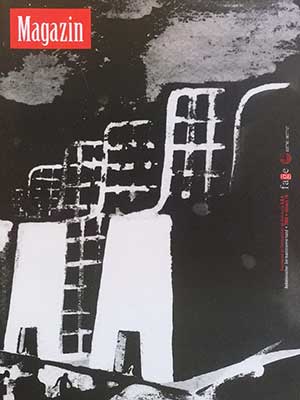Estrategias de comprensión de textos virtuales de temática intercultural: el proyecto CIBERTAAAL
DOI:
https://doi.org/10.12795/mAGAzin.2008.i18.06Resumen
Sin resumenDescargas
Citas
Askehave I. & Nielsen, A. (2004), Webmediated Genres- A Cha- llenge to Traditional Genre The- ory, Working Paper n.6, Cen- ter for Virkshomhedskommu- nikation, Denmark.
Crowston K. & Kwásnik, B. (2005),
«Genres of Digital Documents», Introduction to the Special Is- sue of Information, Technology
& People, Vol. 18, n.2,. P:76- 88.
Enochsson, A. (2005), «The De- velopment of Children’s Web Se- arching Skills, - A non linear Model», in Information Rese- arch, Vol:11, n.1.
(2005) «A Gender Perspective on Internet Use, Consequences for Information Seeking», in Infor- mation Research, retrieved 13 September 2005 from http://in- formationr.net/ir/10-4/pa- per237.html
Large, A. & R.J. Hartley (1999), Information Seeking in the On- line Age: Principles and Practi- ce, ed: Saur.Cop, London.
Shepherd, M. & Watters, C. (1998)
«The Evolution of Cybergenres» Proceedings of the Thirty-First Annual Hawaii International Conference on System Sciences- Volume 2, p. 97.
(1999) «The functionality attribu- te of cybergenres» publ in System Sciences, Proceedings of the 32nd Annual Hawaii Interna-
tional Conference Vol. 2, USA. Slone D. J. (2003), «Internet Se- arch Approaches: The Influen-
ce of Age, Search Goals and Ex- perience», publ. in Lybrary and Information Science Research, vol 25, n. 4, p. 403-418.
Sanz, M. (2003), Las Tecnologías de la Información y de la Co- municación y la autonomía de aprendizaje de Lenguas. Análi- sis crítico y estudio de casos en el aprendizaje del FLE, Publ. Uni- versitat Jaume I, Castelló.
Villanueva Alfonso, M.L. (1997), Los estilos de aprendizaje de Len- guas. Publ. Universitat Jaume I, Summa, Castelló.
Bibliografia sobre interculturalidad
Bolten, J. (2007), Interkulturelle Kompetenz,Verlag:Landeszentra- le für Politische Bildung. Erfurt.
Lewis, R. (2002): Handbuch In- ternationale Kompetenz, Cam- pus-Verlag, Frankfurt/Main;
Maletzke, G. (2004): Interkultu- relle Kommunikation. Zur Inter- aktion zwischen Menschen vers- chiedener Kulturen, West deuts- cher Verlag, Opladen.
Baumer, T.: Handbuch Interkul- turelleKompetenz(2Bände),Ver- lag Orell Füssli, Zürich.
Rathje,S.(2006)«InterkulturelleKom- petenz - Zustand und Zukunft
eines umstrittenen Konzepts», in Zeitschrift für Interkulturellen Fremdsprachenunterricht
Información on-line sobre interculturalidad
Interkulturelle Kompetenz Online (Landeszentrale für politische Bil- dung Thüringen)
Interkulturelle Kompetenz – Zus- tand und Zukunft eines umstritte- nen Konzepts
Informations- und Dokumenta- tionszentrum für Antirassismusar- beit e. V. (IDA)
Verband für Interkulturelle Arbeit
– VIA e.V.
Interculture Journal
Direcciones Erasmus visitadas
http://www.studium.uni- freiburg.de/en/international/inco- ming/socrates/ http://www.erasmus-initiative.uni- bremen.de http://www.esn.org/esn_internatio- nal/section_country.php?Country=ES
Otras webs de interés
Grupo Investigación Giapel:
www.giapel.uji.es
Portfolio Europeo de las Lenguas: http://www.coe.int/t/dg4/portfo- lio/Default.asp?L=E&M=/main_pa- ges/welcome.html
Descargas
Publicado
Cómo citar
Número
Sección
Licencia
Política de autoarchivo
Romeo Blue Journal (en preparación)
Solo se puede archivar el PDF de editor
El autor no puede archivar la versión pre-print
El autor no puede archivar la versión post-sprint
Condiciones generales
La revista se aloja en repositorios de acceso abierto
La revista se edita en formato impreso bajo demanda y para fines promocionales y de depósito legal en un porcentaje inferior al 5%
No prevé moving wall o período de embargo
Debe utilizarse la versión de editor/PDF
La fuente editorial debe reconocerse
Creative Commons Reconocimiento-NoComercial-SinObraDerivada 4.0 Internacional





